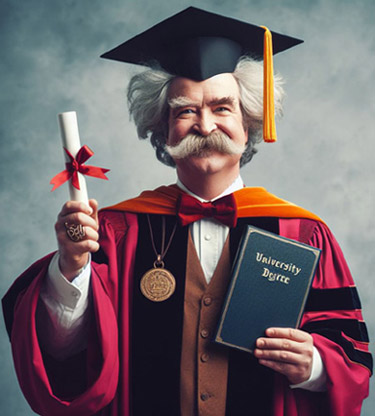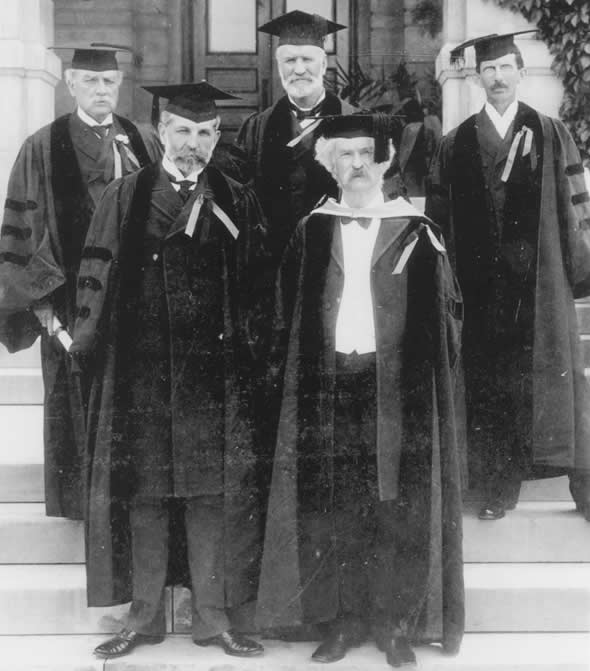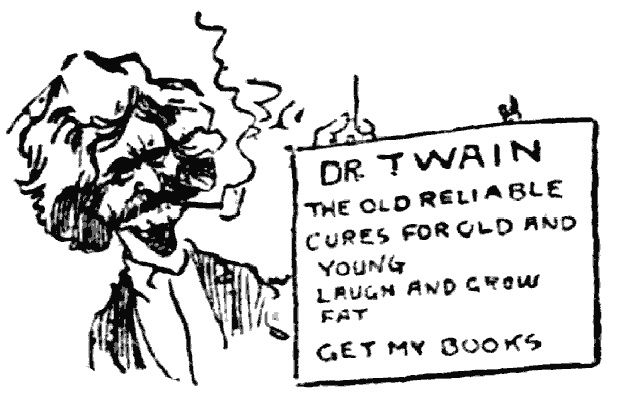

|
Now then, to me university degrees are unearned finds,
and they bring the joy that belongs with property acquired in that way;
and the money-finds and the degree-finds are just the same in number up
to date--three: two from Yale and one from Missouri University. It pleased
me beyond measure when Yale made me a Master of Arts, because I didn't
know anything about art; I had another convulsion of pleasure when Yale
made me a Doctor of Literature, because I was not competent to doctor
anybody's literature but my own, and couldn't even keep my own in a healthy
condition without my wife's help. I rejoiced again when Missouri University
made me a Doctor of Laws, because it was all clear profit, I not knowing
anything about laws except how to evade them and not get caught. And now
at Oxford I am to be made a Doctor of Letters--all clear profit, because
what I don't know about letters would make me a mutli-millionaire if I
could turn it into cash. |
 AI image created by R. Kent Rasmussen |
| I take the same childlike delight in a new
degree that an Indian takes in a fresh scalp and I take no more pains to
conceal my joy than the Indian does. - Autobiography of Mark Twain, Vol 3 (2015)
|
 Mark Twain at Oxford |

University
of Missouri, June 1902
Front row with Mark Twain is
Robert Somers Brookings, founder of Brookings Institute.
Back row left - Ethan Allen Hitchcock - Secretary of Interior
Back row center - James Wilson - Secretary of Agriculture
Back row right - Dr. Beverley Thomas Galloway - Assistant Secretary of Agriculture.
Photo from Collection C:1/141/8, Courtesy of University
Archives,
University of Missouri-Columbia
| Regarding Arthur Twining Hadley, former president of Yale: Now there's a very remarkable man. I'll never forget what he said about me, the day I was invited by Yale to come up and be given a degree. The great platform was filled with men to be honored. Our writer group was put somewhat upstage. Quite a few of the boys were there, Howells, Cable and other writers I knew; and as each was called down to receive his degree, President Hadley in a few words gave a most wonderful summing up of the character and achievements of each. As each came back, he'd whisper to me: 'Sam, what will Hadley say about you and your dark and checkered career?' They made me so nervous I couldn't sit still. At last my turn came. Downstage I walked. When an official called the name of Samuel Clemens, the New Haven boys all rose to their feet and made quite a noise. When at last it was over, Hadley declared: 'After this demonstration, anything I could say would be useless.' Hooded and honored I came back without knowing what Hadley had meant to say. I was disappointed and so were the boys. But one of them told me, at the end of the ceremonies that day: 'Sam, every speech that Hadley made was written ahead in a little book, which is in the hands of his secretary, that young woman over there.' Eagerly I went to her and never have I flattered a female as I did that young woman that day. At last she let me see the book. As I turned the pages, every speech exactly as it had been spoken was there. Faster I turned them with feverish hands! And on the last page I read these lines: 'Samuel Clemens. After this demonstration anything I could say would be useless.' - quoted in The Bridge by Ernest Poole, p. 172. |
|
To be made a master of arts by your venerable college is an event of large size to me, and a distinction which gratifies me quite as much as if I deserved it. To be noticed in this way by the university would be pleasing to me at any time, but it is peculiarly so at this juncture. The late Matthew Arnold rather sharply rebuked the guild of American "funny men" in his latest literary delivery, and therefore your honorable recognition of us is peculiarly forcible and timely. A friendly word was needed in our defense, and you have said it, and
it is sufficient. It could not become us -- we being in some ways, and
at intervals, modest, like other folk -- to remind the world that ours
is a useful trade, a worthy calling; that with all its lightness and frivolity
it has one serious purpose, one aim, one specialty, and it is constant
to it -- the deriding of shams, the exposure of pretentious falsities,
the laughing of stupid superstitions out of existence; and that whoso
is by instinct engaged in this sort of warfare is the natural enemy of
royalties, nobilities, privileges and all kindred swindles, and the natural
friend of human rights and human liberties. We might with propriety say
these things, and so hint that in some degree our calling is entitled
to respect, but since you have rehabilitated us it is not necessary. I
offer my best thanks to the corporation of Yale university for the high
honor which they have conferred upon me, and am very sorry that my circumstances
deny me the privilege of saying my thanks by word of mouth at the dinner
tomorrow night. With great respect, I am truly yours, S. L. CLEMENS. |

Illustration from
Washington Times, June 28, 1907
reprinting the Philadelphia Inquirer
Quotations | Newspaper Articles | Special Features | Links | Search